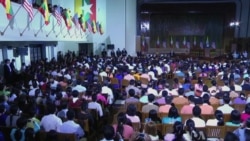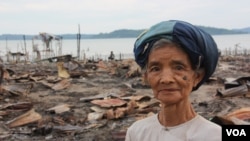RHAKINE STATE, BURMA —
Burma's communal fighting in western Rakhine state this year has led many Buddhists and Muslims to question whether they can live together again as neighbors. President Barack Obama drew attention to the issue during his historic visit to Burma.
The president pledged support for Burma's political opening during his speech at Rangoon University, but he also underscored the risk of ethnic and religious tensions.
"No process of reform will succeed without national reconciliation," Obama noted.
Communal violence between Buddhists and Muslims in western Rakhine state killed at least 170 people and displaced more than 100,000, crowding temporary relief camps.
The vast majority are Rohingya, a stateless Muslim minority considered one of the world's most persecuted people.
Manager of Thet Kae Pying relief camp, Shwe Hla, says they do not want to stay here, but are not sure if they can be neighbors again with Rakhine Buddhists.
Entire neighborhoods were burned down in revenge attacks, including numerous places of worship.
They are now guarded by military and police.
Each side is blaming the other for the violence that has left the communities angry and living in different relief camps.
Oo Kyaw Thein, the manager of Ywagi North relief camp said Rakhine also wish to return home. but many are too afraid.
"We Rakhine people were bullied by them several times. This is the end of our relationship," Oo Kyaw Thein said. "It is better if the two communities stay apart from each other."
Rakhine state spokesman Win Myaing hopes a permanent segregation will not be necessary.
"It depends on local authorities. We need to wait and see," Win Myaing said. "As I said before, in the past there were small incidents of violence between two communities, but after one or two week or a month they could live together again. But, the current incident is quite different from the previous ones. Therefore, we need to wait and see."
Authorities deny accusations that local security forces sided with Rakhine Buddhists in the fighting.
For now, police sent from Rangoon have taken control of security in Sittwe while thousands of soldiers maintain a fragile peace throughout Rakhine state.
The president pledged support for Burma's political opening during his speech at Rangoon University, but he also underscored the risk of ethnic and religious tensions.
"No process of reform will succeed without national reconciliation," Obama noted.
Communal violence between Buddhists and Muslims in western Rakhine state killed at least 170 people and displaced more than 100,000, crowding temporary relief camps.
The vast majority are Rohingya, a stateless Muslim minority considered one of the world's most persecuted people.
Manager of Thet Kae Pying relief camp, Shwe Hla, says they do not want to stay here, but are not sure if they can be neighbors again with Rakhine Buddhists.
Entire neighborhoods were burned down in revenge attacks, including numerous places of worship.
They are now guarded by military and police.
Each side is blaming the other for the violence that has left the communities angry and living in different relief camps.
Oo Kyaw Thein, the manager of Ywagi North relief camp said Rakhine also wish to return home. but many are too afraid.
"We Rakhine people were bullied by them several times. This is the end of our relationship," Oo Kyaw Thein said. "It is better if the two communities stay apart from each other."
Rakhine state spokesman Win Myaing hopes a permanent segregation will not be necessary.
"It depends on local authorities. We need to wait and see," Win Myaing said. "As I said before, in the past there were small incidents of violence between two communities, but after one or two week or a month they could live together again. But, the current incident is quite different from the previous ones. Therefore, we need to wait and see."
Authorities deny accusations that local security forces sided with Rakhine Buddhists in the fighting.
For now, police sent from Rangoon have taken control of security in Sittwe while thousands of soldiers maintain a fragile peace throughout Rakhine state.






